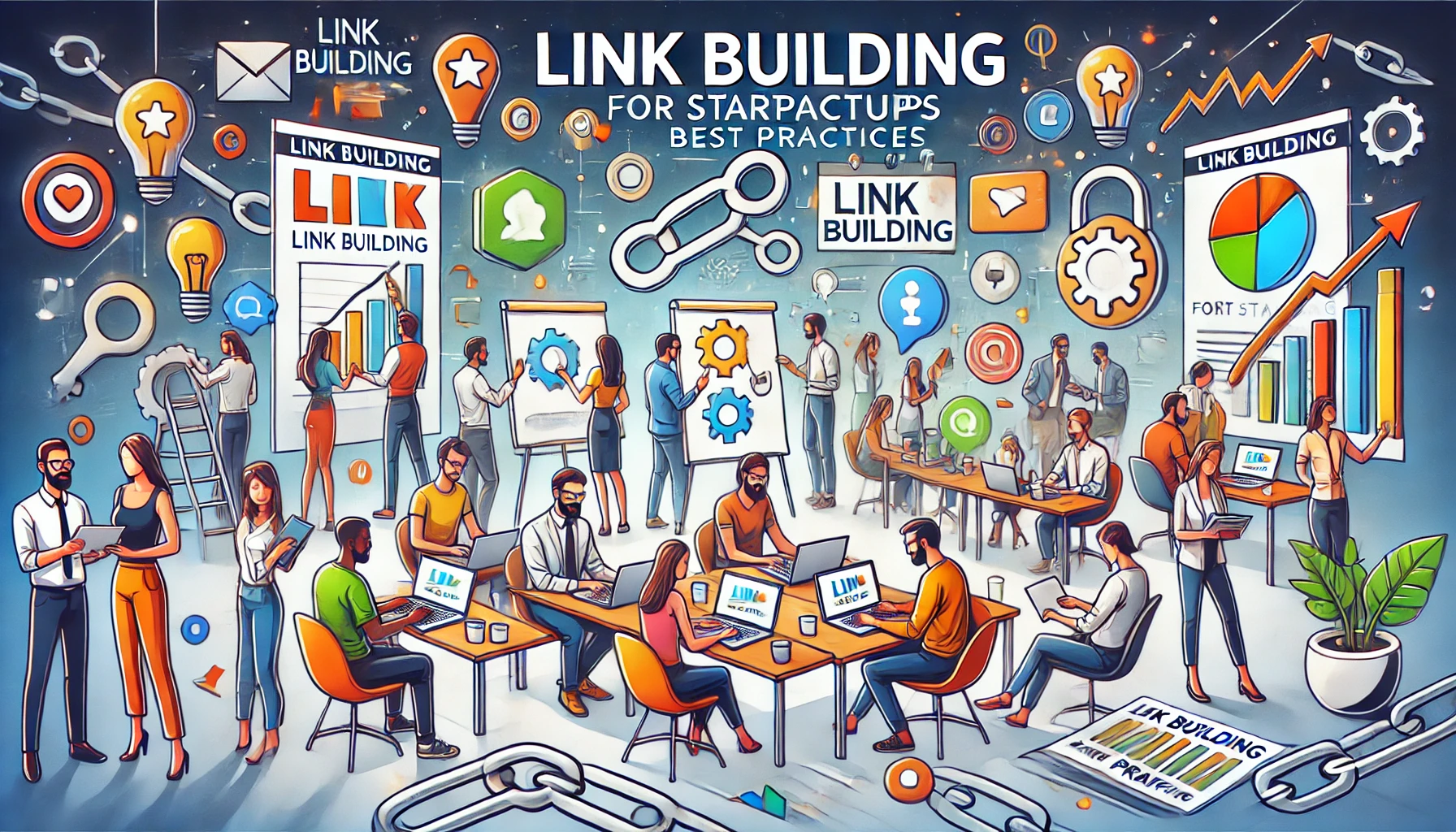Link building remains a critical component of SEO strategy for startups in 2024, offering substantial benefits in visibility, credibility, and organic traffic. Here are key points to consider:
- Quality Over Quantity: Focus on acquiring high-quality backlinks from authoritative sites within your niche. This improves your search engine ranking and enhances your brand’s credibility.
- Content is king. Produce insightful, engaging content that builds backlinks on its own. Consider blog posts, infographics, videos, and industry reports that provide unique insights or solve specific problems for your target audience.
- Networking and Relationships: Build relationships with influencers, bloggers, and other businesses in your industry. Networking can lead to guest posting opportunities and collaborations that yield valuable backlinks.
- Utilize Social Media: Leverage social media platforms to promote your content and engage with your audience. Increased visibility on social channels can lead to more shares and natural backlinks.
- Monitor and Adapt: Use tools like SEMrush, Ahrefs, or Moz to track your link-building progress and analyze competitors. Stay updated with the latest SEO trends and be ready to adapt your strategies accordingly.
Table of Contents
ToggleWhat Are Backlinks?

Links from one website to another are called backlinks, sometimes referred to as inbound or incoming links. They play a vital role in SEO by signaling to search engines the relevance and credibility of your content. Here are key points to understand about backlinks:
- Importance in SEO: Backlinks are a major ranking factor used by search engines to determine the authority and relevance of a webpage.
- Quality Matters: Not all backlinks are equal; links from reputable, high-authority sites are more valuable than those from low-quality sites.
- Natural vs. Artificial: Natural backlinks are earned organically when others link to your content, while artificial backlinks are acquired through deliberate efforts like link exchanges or paid links.
- Dofollow vs. Nofollow: Dofollow backlinks pass on SEO value and can improve your search engine rankings, whereas nofollow backlinks do not pass on SEO value but can still drive traffic.
- Anchor Text: The clickable text of a backlink, known as anchor text, provides context about the content being linked to and can impact SEO rankings.
- Diverse Sources: A varied backlink profile with links from different types of sites (blogs, news sites, forums, etc.) is more beneficial than having many links from a single source.
- Referral Traffic: Backlinks also drive referral traffic from other websites, bringing in visitors who might not find your site through search engines alone.
Link Building For Startups: Best Practices

Link building is a crucial element of a successful SEO strategy for startups, providing the foundation for increased visibility, traffic, and credibility. Observe the following excellent practices:
- Focus on Quality Links:
- Prioritize obtaining backlinks from reputable, high-authority websites within your industry.
- Aim for links from sources such as industry blogs, news websites, and influential social media profiles.
- Create Valuable Content:
- Provide unique, high-quality content that will organically draw links.
- Consider creating blog posts, infographics, case studies, white papers, and videos that provide value to your audience.
- Guest Blogging:
- Write guest posts for well-known blogs and websites in your niche.
- Ensure that your content is informative and relevant, with a backlink to your startup’s website.
- Build Relationships:
- Make connections with bloggers, other companies, and industry influencers.
- Engage in online communities and forums related to your industry to establish connections.
- Utilize Social Media:
- Post links to your material on social media sites to boost exposure and promote backlinks and shares.
- Participate in relevant groups and discussions to gain more exposure.
- Monitor and Analyze:
- Use tools like SEMrush, Ahrefs, or Moz to track your backlinks and analyze the performance of your link-building efforts.
- Determine which tactics work best, then adjust your strategy accordingly.
- Leverage Local Listings and Directories:
- Submit your startup to local business directories and industry-specific listings.
- Ensure your business information is consistent across all listings for better local SEO.
What You Should Avoid In Link Building

When pursuing link building for your startup, it’s essential to steer clear of practices that could harm your SEO efforts. Here are key practices to avoid:
- Buying Links:
- Purchasing backlinks from link farms or other shady sources can lead to penalties from search engines. This tactic is considered a violation of Google’s guidelines.
- Using Low-Quality or Spammy Sites:
- Avoid linking to or obtaining links from websites with poor domain authority, irrelevant content, or spammy practices. These links can dilute your site’s credibility and ranking.
- Overusing Exact Match Anchor Text:
- Stuffing the anchor text with exact-match keywords can be seen as manipulative. Use a natural, varied anchor text profile to avoid penalties.
- Participating in Link Farms or Link Networks:
- Joining link farms or networks where the sole purpose is to exchange links without adding value can severely harm your site’s reputation and ranking.
- Neglecting Quality Content:
- Avoid focusing solely on quantity over quality. Search engines prioritize valuable, well-researched content that genuinely benefits readers.
- Ignoring User Experience:
- Building links without considering the user experience on your site can lead to high bounce rates and low engagement, negatively impacting your SEO.
- Failing to Diversify Link Sources:
- Relying too heavily on one type of link or a single source can be risky. Aim for a diverse backlink profile to enhance your site’s authority and resilience against penalties.
- Using Automated Link Building Tools:
- Automated tools that generate backlinks without human oversight can lead to spammy links. Stick to ethical practices and manual outreach.
Effective Link-Building Techniques in 2024
Link building continues to be a cornerstone of SEO strategy, evolving with search engine algorithms and user behaviours. Here are some effective techniques for 2024:
- Content Marketing:
- Create High-Quality Content: Develop valuable, shareable content such as blog posts, infographics, videos, and comprehensive guides that naturally attract backlinks.
- Publish Original Research: Conduct and share unique research or data that others in your industry will want to reference.
- Guest Blogging:
- Target Reputable Sites: Write guest posts for authoritative websites in your niche. Ensure the content is relevant and insightful, and includes a backlink to your site.
- Maintain Quality: Focus on quality over quantity. One link from a high-authority site can be more valuable than several from lower-quality sites.
- Influencer Outreach:
- Collaborate with Influencers: Partner with industry influencers to create and promote content. Influencers can provide high-quality backlinks and drive traffic.
- Build Relationships: Establish and maintain genuine relationships with influencers and thought leaders in your industry.
- Broken Link Building:
- Find Broken Links: To locate broken links on relevant domains, use tools such as Ahrefs or SEMrush.
- Offer Your Content: Reach out to the site owners, informing them of the broken link and suggesting your relevant content as a replacement.
- Digital PR:
- Craft Press Releases: Create compelling press releases for newsworthy events related to your business and distribute them through reputable PR channels.
- Engage with Journalists: Build relationships with journalists and media outlets to earn mentions and backlinks in news articles and industry publications.
- Skyscraper Technique:
- Find Popular Content: Identify high-performing content in your niche.
- Create Better Content: Develop an improved version of that content with more depth, updated information, and better visuals.
- Promote Your Content: Reach out to websites that link to the original content and suggest your superior version as an alternative.
- Community Engagement:
- Participate in Forums and Q&A Sites: Engage in relevant forums, discussion boards, and Q&A sites like Quora, providing valuable insights and linking back to your content where appropriate.
- Leverage Social Media: Share your content on social media platforms to increase visibility and potential backlinks from social shares.
- Utilize Resource Pages:
- Find Resource Pages: Search for resource pages in your industry that list useful links.
- Suggest Your Content: Reach out to the site owners with your valuable content, suggesting it as a useful addition to their resource page.
Monitor Your Backlinks Profile
Regularly monitoring your backlinks profile is crucial for maintaining and improving your SEO performance. Here’s how to effectively monitor and manage your backlinks:
- Use Reliable Tools:
- Ahrefs: Provides comprehensive backlink analysis, showing new, lost, and broken links, as well as the overall health of your backlink profile.
- SEMrush: Offers detailed reports on backlinks, anchor texts, and referring domains, along with competitor analysis.
- Moz: Features backlink tracking, spam score analysis, and domain authority metrics.
- Track New and Lost Links:
- New Links: Regularly check for new backlinks to understand which content and strategies are working best.
- Lost Links: Identify lost links and investigate why they were removed. Reach out to the site owners to restore valuable links if possible.
- Analyze Link Quality:
- Domain Authority: Monitor the domain authority of sites linking to you. High-authority sites provide more SEO value.
- Spam Score: Keep an eye on the spam score of linking domains. High spam scores can negatively impact your SEO.
- Review Anchor Texts:
- Diversity: Ensure a diverse range of anchor texts to avoid over-optimization penalties.
- Relevance: Check that anchor texts are relevant to the linked content and appear natural.
- Identify and Disavow Toxic Links:
- Toxic Links: Identify potentially harmful links from spammy or low-quality sites.
- Disavow Tool: Use Google’s Disavow Tool to inform search engines to ignore these links, preventing negative impacts on your rankings.
- Competitor Analysis:
- Compare Backlink Profiles: Analyze competitors’ backlink profiles to identify potential link-building opportunities and benchmark your performance.
- Adopt Successful Strategies: Learn from successful competitors and adapt their effective link-building tactics.
- Monitor Referral Traffic:
- Google Analytics: Use Google Analytics to track referral traffic from your backlinks. This helps you understand which links are driving the most traffic and engagement.
- Behaviour Analysis: Analyze user behaviour from referral traffic to optimize content and link placement.
- Regular Reporting:
- Monthly Reports: Generate monthly reports to track the progress of your backlink profile, identifying trends and areas for improvement.
- Adjust Strategies: Use the insights from your reports to refine your link-building strategies and focus on what works best.
Conclusion :
By consistently monitoring your backlinks profile, you can maintain a healthy and effective link-building strategy, ensuring long-term SEO success and improved search engine rankings. Staying vigilant and proactive in managing your backlinks not only safeguards your website from potential penalties but also helps you capitalize on opportunities to enhance your online presence. As the digital landscape continues to evolve, a robust backlink profile will remain a cornerstone of a successful SEO strategy, driving sustainable growth and visibility for your business.





